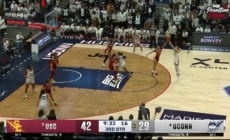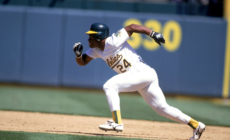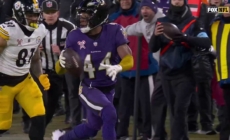-
Juju Watkins blocks Paige Bueckers and lays it up on the other end, extending USC’s lead vs. UConn - 10 mins ago
-
Former NASCAR Driver Confirms Full-Time Racing Return In 2025 - 36 mins ago
-
Tom Brady’s LFG Player of the Game for Week 16: Ravens QB Lamar Jackson - 53 mins ago
-
Chandler Smith Secures Full-Time NASCAR Drive After Joe Gibbs Racing Exit - about 1 hour ago
-
Tom Brady praises Lamar Jackson & Derrick Henry in Ravens' win vs. Steelers | NFL on FOX - 2 hours ago
-
At least 5 killed, 200 injured after car plows into Christmas market in Germany - 2 hours ago
-
Was Rickey Henderson Greatest MLB Player of All Time? Where Does He Rank? - 2 hours ago
-
Tom Brady is fired up by Ravens CB Marlon Humphrey's 37-yard pick-six vs. Steelers | NFL Highlights - 2 hours ago
-
Venturini Motorsports Announces Toni Breidinger ARCA Menards Replacement - 3 hours ago
-
Party City files for bankruptcy, a day after announcing mass layoffs at its headquarters - 3 hours ago
Venezuela sidelines any opponents of Maduro as it announces election date
MEXICO CITY — Venezuela’s presidential election so far is a one-horse race for incumbent President Nicolás Maduro. That’s not for a lack of potential challengers, or because of any great affection from voters. It’s because he’s the only politician with the means for a campaign and a guaranteed spot on the ballot.
Electoral authorities this week announced that the highly anticipated election will take place July 28. Maduro is sure to represent the powerful United Socialist Party of Venezuela. His government has sidelined his strongest challenger, and the remaining contenders lack enough political machinery for a viable campaign.
The announcement reflected the government’s intention to move on from a heated debate over its decision to bar opposition leader María Corina Machado from public office. Candidates must register by late March, giving Machado and other opposition factions less than three weeks to decide next steps.
Machado is the first real political threat Maduro has faced in years.
A former lawmaker, she maintained a somewhat low profile in recent years and rose to the top of the opposition leadership in 2023 thanks to a void left when other leaders went into exile, and careful messaging that softened her reputation as an unyielding politician.
Maduro’s government moved to block her, starting with a June announcement that she was banned from running for office.
The administrative ban, however, did not keep her out of an October primary, because the opposition Unitary Platform coalition, which is backed by the United States, organized the vote without assistance from Venezuela’s electoral authorities.
The free-market proponent won the contest with more than 90% of the vote. Venezuela’s top court complicated her presidential aspirations in January by affirming her ban, although she has continued campaigning and has rejected suggestions to choose a substitute.
“The people gave a mandate, and they gave the mandate to me,” Machado told supporters Thursday. “Listen to me carefully, to those who are talking about a substitute … yes, there is a substitute here. Do you know who? That’s me — the one who is going to replace Nicolás Maduro!”
Machado has refused to explain her strategy to overcome the ban, only offering platitudes to supporters that she is in the race “until the end.”
The ruling party is expected to officially name Maduro as its candidate next week. Lawmakers jubilantly chanted “Vamos Nico! Vamos Nico!” during a legislative session Tuesday after the election date was announced.
Maduro became Venezuela’s interim president in March 2013 after the death of Hugo Chávez, whose homespun charm earned him the affection and votes of millions. Maduro was narrowly elected a few months later and re-elected in 2018 to a six-year term in an electoral process widely criticized as fraudulent.
Maduro’s presidency has been marked by a complex social, economic and political crisis that has pushed more than 7.4 million people to emigrate, primarily to Latin American and Caribbean countries.
Now, a few politicians who are ruling party allies and a former television reporter have expressed intentions to face off against Maduro. None have the party structure, voter support or financial resources needed to run a competitive campaign.
Election campaigns in Venezuela typically involve handouts of free food, home appliances and other goods on behalf of governing party candidates, who also get favorable state media coverage. Opposition candidates and their supporters struggle to find places to gather without harassment from government activists and to get fuel to travel across the country.
The Unitary Platform’s primary had 10 candidates, including Machado, who does not belong to the group but was allowed to run as an independent. Candidates she defeated have rallied around her.
“It’s understandable why María Corina Machado plays the card of being the candidate. She won the primary hands down,” said Christopher Sabatini, senior fellow for Latin America at the London-based Chatham House. But her inflexible rhetoric may make it impossible for the opposition to prepare a viable alternative to her, Sabatini said.
In hopes that the ban on Machado could somehow be lifted, the Unitary Platform could register a provisional candidate now and substitute Machado for that person up to 10 days before the election. The substitution would require approval of electoral authorities.
The July 28 date — also Chávez’s birthday — was chosen from among more than 20 proposed based on input from ruling party allies, business associations, university officials, religious groups and other organizations.
The Unitary Platform did not participate in any of the meetings that led to the election proposals. The group and Maduro’s government have held on-again-off-again negotiations since 2021. In October, they reached what at the time was seen as a pivotal agreement to work toward a fair election.
The deal, signed in the Caribbean island of Barbados, called for the contest to be held in the second half of 2024 in the presence of international observers. It also called for a process for presidential contenders to appeal bans on running for office.
The deal immediately earned Maduro some reprieve from economic sanctions imposed by the U.S. But one of the sanctions has already been reimposed as the Venezuelan government has tested limits of the agreement, including by opening criminal investigations against the organizers of the primary that Machado won.
Ryan Berg, director of the Americas Program at the Washington-based Center for Strategic and International Studies, noted that the government chose Chávez’s July 28 birthday for the election and announced the date on the March 5 anniversary of his death. That signals their intention not to allow anyone but Chávez’s chosen successor, Maduro, to win the election, Berg said.
The election plans mean that Maduro and his representatives “are not abiding by the spirit of the agreement, even if they are abiding by the letter of the agreement,” Berg said.
Source link





























